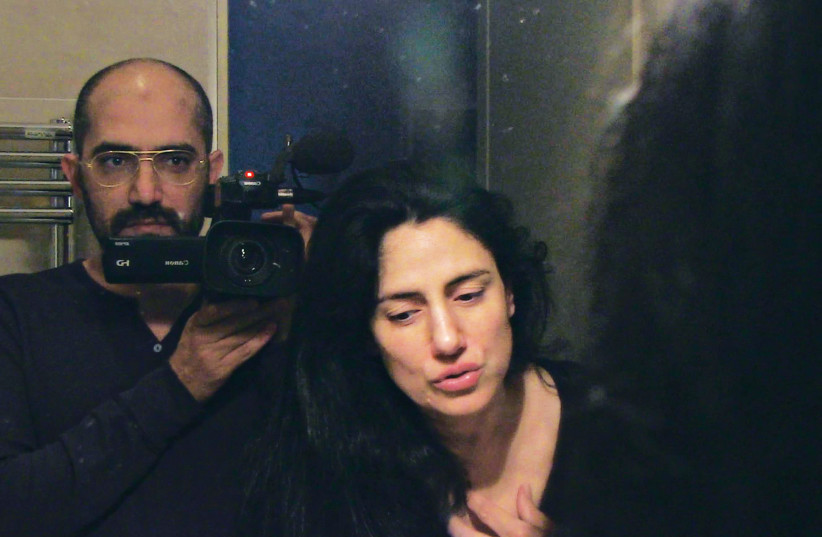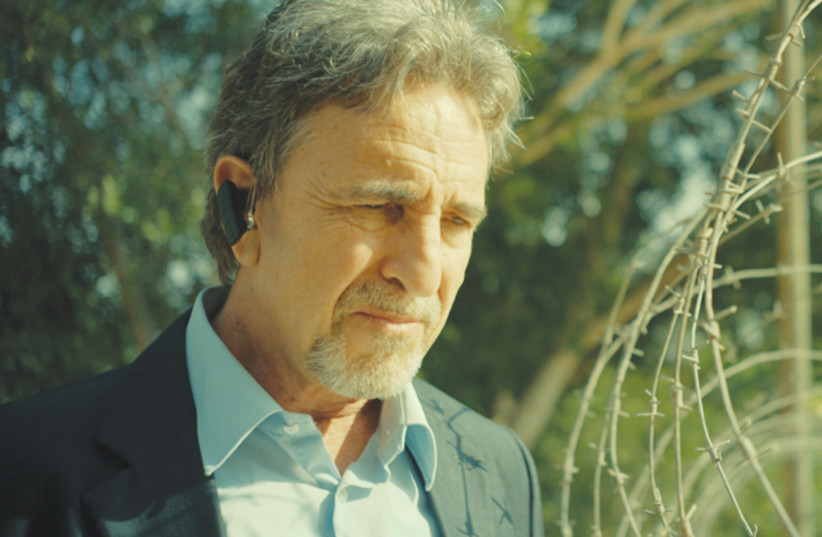For the first time in a long time, three very different Israeli movies have just opened throughout the country or are about to open.
People are always looking for movies that show how alienated young people are and Hadas Ben Aroya is the latest Israeli filmmaker to provide a look into youth culture, presenting loveless hookups among young adults in Tel Aviv in a matter-of-fact way. An actress as well as a director, she starred and was very effective in her 2016 debut feature, People That Are Not Me, a title that poked fun at the solipsism of its characters. But she doesn’t act in her new film, All Eyes Off Me, which opens throughout Israel on December 16, and although the movie doesn’t flow as well as her first film, it tied for the Haggiag Award for Best Israeli Feature Film at the Jerusalem Film Festival last summer, sharing the prize with Tom Shoval’s Shake Your Cares Away. The lead actress, Elisheva Weil, also won the Anat Pirchi Award for Best Actress at the Jerusalem Film Festival.
All Eyes Off Me is divided into three parts, linked by Avishag, Weil’s character. In the first story, Danny (Hadar Katz), goes to a party looking for Max (Leib Levin). They recently had a one-night stand and now she is pregnant and is planning to have an abortion. When she sees him there flirting with Avishag, she just can’t tell him about the pregnancy and she acts as if they are the most casual of acquaintances. It’s hard to tell how much she cares for him, but it’s clear that on some level she is jealous and hurt and your heart goes out to her. In a more conventional movie, Danny and her pregnancy would be the focus but the rest of the movie is about Avishag. In the second part, she is in bed with Max and both of the lovers make a confession. He tells her that on trip to the Philippines, he discovered he is really attracted by effeminate young men, while she tells him she likes to be slapped around during sex and convinces him to beat her. Unenthusiastically, he obliges. Their whole exchange is unsexy and
lacking in passion, so much so that I wondered what we were supposed to take from it. It seemed that neither was really into the other, to borrow a concept from Sex and the City. I wasn’t sure if her masochism was supposed to be a valid choice (“Not that there’s anything wrong with that,” to borrow a Seinfeld quote) or if it was meant to show that she was filled with self loathing and wanted to be humiliated. Similarly, it was not clear if his confession indicated that he was not really that attracted to Avishag. Either way, it was not much fun watching all this play out.
In the third and final segment, Avishag seduces the chubby, reclusive middle-aged man (Yoav Hayt) whose dogs she walks. He is overjoyed, even though she seems to be toying with him for obscure reasons. She doesn’t ask him to beat her, as she asked Max, and I was grateful she didn’t, so I didn’t have to sit through another scene like that again. It’s probably pointless for me to try to figure out the characters’ motivations in depth. Perhaps Avishag is simply meant to be a confused young woman, emblematic of a generation that has a hard time committing and settling down. The whole movie has a realistic, improvised quality, but much of it is dull to sit through and it felt much longer than it actually was.

Shlomi Elkabetz’s Black Notebooks, currently playing around the country, is a documentary that premiered at the Cannes Film Festival this year and which won the award for Best Israeli Documentary at the Jerusalem Film Festival. It is an intimate look at the life of his late sister, Israeli actress Ronit Elkabetz, who died in 2016 at the age of 51. Shlomi Elkabetz is an actor, director, screenwriter and producer, whom audiences will know best as the main detective on the HBO/Keshet series, Our Boys.
Ronit Elkabetz commanded the screen in every role she played, including in such films as Dover Koshashvili’s Late Marriage and Eran Kolirin’s The Band’s Visit, as well as an extraordinary trilogy she wrote and directed with her brother where she portrays an unhappily married Moroccan woman, based on her mother: To Take a Wife (2004), Shiva (2008) and Gett (2014). Ronit also had a flamboyant personality, charming interviewers and audiences alike, wearing fashion-forward designer outfits to premieres and always bringing a touch of glamour to any event she attended. Fluent in French, she also had a successful career in France and loved spending time at her apartment in Paris. It’s difficult to imagine what heights she would have achieved as an actress and director had she lived.

The 210-minute film is composed of home movies of Ronit, clips from her films and interviews with her parents. There are moments that are very moving, especially those that show her embracing marriage and motherhood just a few years before her death, as well as those that detail her battle with cancer. Asked about her short hair at an awards ceremony, she said, convincingly: “It’s my new look,” with few realizing she was undergoing chemotherapy. But much of this documentary feels as if it is far more intense for the filmmaker than for the viewer. For every compelling clip, there are three or four that have far less impact. Even the actress’s most ardent fans will find this slow going. Black Notebooks is clearly a labor of love, but a notebook is a place where you jot down all your private thoughts, with no thought of polishing or publishing them, and maybe the director was too close to the subject to shape the material effectively.
Mr. Kohl’s Final Hour, now in theaters, a movie by Doron Eran, is an adaptation of the play by Yehoshua Sobol, and it is mostly a monologue by its lead actor, Ohad Shahar. It takes place outside of a prison and it is very much a theater piece.

Kohl is a lawyer about to go into the prison to start serving a sentence for a desperate act after his client committed suicide in a case against a corrupt drug company. The film references Franz Kafka’s The Trial, in which the hero, Joseph K., protests his innocence after he is arrested and dragged into a bizarre, incomprehensible legal system. As he talks to the prison authorities and waits for a clearly unrealistic last-minute reprieve and also speaks to various women in his life, it becomes clear that he has been guilty of many hurtful, selfish actions. The movie shows how, as is so often the case, the fact that he was on the side of the angels in this court case does not make him a decent human being. There are a lot of ideas at work in this relatively brief film – it runs 80 minutes – and it is all anchored around Shahar’s riveting performance. But it does grow wearying to watch a man on the phone for nearly an hour and a half. Maybe it would have been even more effective to see this drama on stage, where the intensity of the live performance might have made it more enjoyable.
